新概念第一册词汇语法第95课:Tickets, please
- 格式:docx
- 大小:38.17 KB
- 文档页数:4
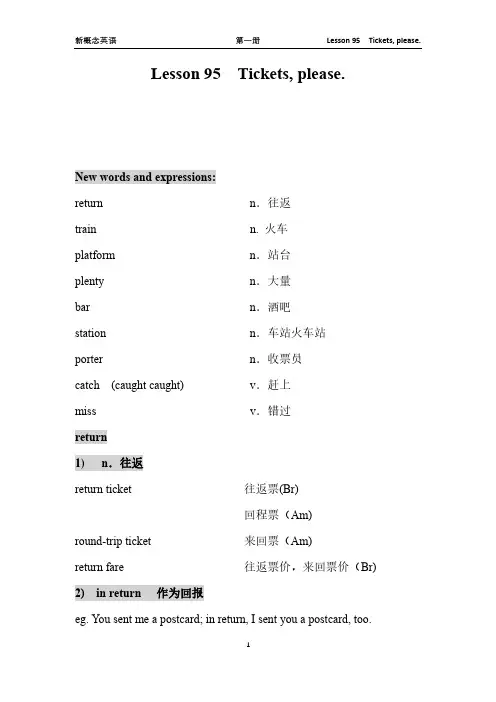
Lesson 95 Tickets, please.New words and expressions:return n.往返train n. 火车platform n.站台plenty n.大量bar n.酒吧station n.车站火车站porter n.收票员catch (caught caught)v.赶上miss v.错过return1)n.往返return ticket往返票(Br)回程票(Am)round-trip ticket 来回票(Am)return fare往返票价,来回票价(Br) 2) in return作为回报eg. You sent me a postcard; in return, I sent you a postcard, too.你给我寄来明信片,我也回寄一张明信片。
eg. The employees have worked so hard. Their boss is going to increase their salary in return.这些职员一直都在非常努力地工作。
他们老板打算给他们加薪作为回报。
3) v.回到return from… to… 从…回到…return to 回到(先前的状态,话题)return sth to sbreturn sb sth 把…归还某人train1) n.火车eg. We'11 take the 2:00 p.m. train to Shanghai.我们要搭下午2点的火车去上海。
an up train上行列车a down train下行列车an express train 快车2)v. 训练,培养eg. He is braining the horse for the race.他为了比赛在训练那匹马。
eg. I was trained as a nurse.我接受过护士的训练。
eg. You should train your children how to respect others.你应该教导你的孩子如何尊重别人。
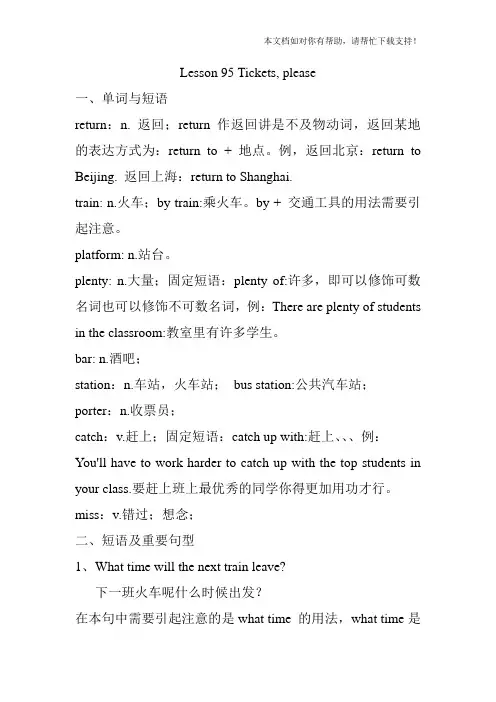
Lesson 95 Tickets, please一、单词与短语return:n. 返回;return 作返回讲是不及物动词,返回某地的表达方式为:return to + 地点。
例,返回北京:return to Beijing. 返回上海:return to Shanghai.train: n.火车;by train:乘火车。
by + 交通工具的用法需要引起注意。
platform: n.站台。
plenty: n.大量;固定短语:plenty of:许多,即可以修饰可数名词也可以修饰不可数名词,例:There are plenty of students in the classroom:教室里有许多学生。
bar: n.酒吧;station:n.车站,火车站;bus station:公共汽车站;porter:n.收票员;catch:v.赶上;固定短语:catch up with:赶上、、、例:You'll have to work harder to catch up with the top students in your class.要赶上班上最优秀的同学你得更加用功才行。
miss:v.错过;想念;二、短语及重要句型1、What time will the next train leave?下一班火车呢什么时候出发?在本句中需要引起注意的是what time 的用法,what time是“什么时间”的意思,通常用来对具体的时刻进行提问,在一般情况下,what time 可以与when互换,例:What time will the meeting begin?会议什么时候开始?另一种表达方式为:When will the meeting begin?除此之外,我们需要掌握时间的表达法:三十分钟及三十分钟之前用介词past,三十分钟之后用介词to,整点用o′clock,十五分及四十五分用a quarter, 例:6:00:six o′clock; 6:15: a quarter past six;6:30:half past six; 6:45: a quarter to seven.2、We have got plenty of time.我们还有许多时间。
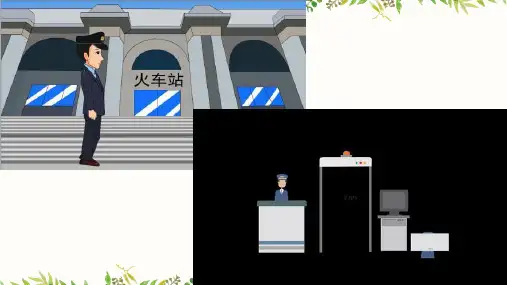
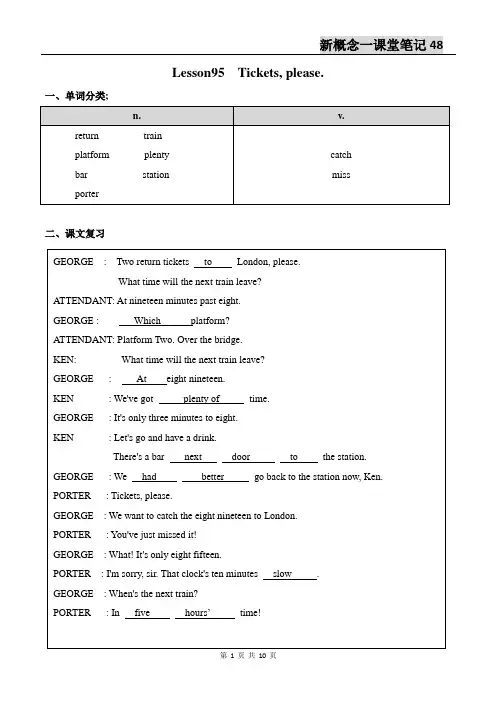
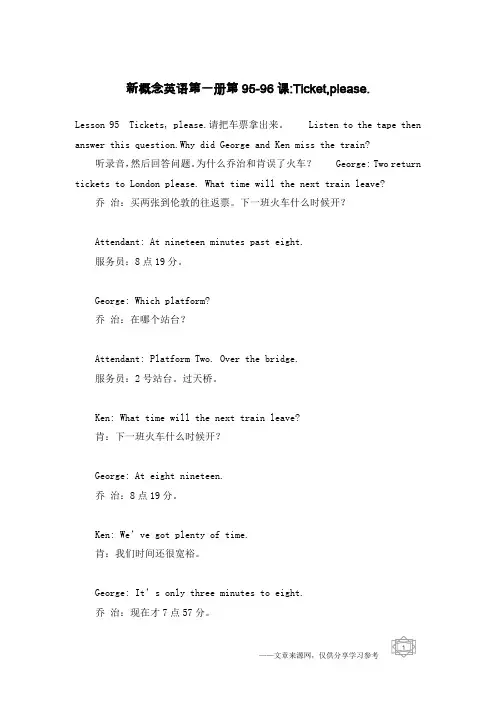
新概念英语第一册第95-96课:Ticket,please.Lesson 95 Tickets, please.请把车票拿出来。
Listen to the tape then answer this question.Why did George and Ken miss the train?听录音,然后回答问题。
为什么乔治和肯误了火车?George: Two return tickets to London please. What time will the next train leave?乔治:买两张到伦敦的往返票。
下一班火车什么时候开?Attendant: At nineteen minutes past eight.服务员:8点19分。
George: Which platform?乔治:在哪个站台?Attendant: Platform Two. Over the bridge.服务员:2号站台。
过天桥。
Ken: What time will the next train leave?肯:下一班火车什么时候开?George: At eight nineteen.乔治:8点19分。
Ken: We’ve got plenty of time.肯:我们时间还很宽裕。
George: It’s only three minutes to eight.乔治:现在才7点57分。
Ken: Let’s go and have a drink. There’s a bar next door to the station. 肯:让我们去喝点东西吧,车站旁有一个酒吧。
George: We had better go back to the station now, Ken.乔治:肯,我们现在最好回车站去。
Porter: Tickets please.收票员:请把车票拿出来。
George: We want to catch the eight nineteen to London.乔治:我们要乘8点19分的车去伦敦。
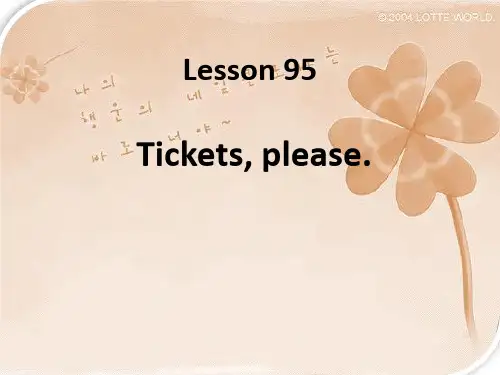
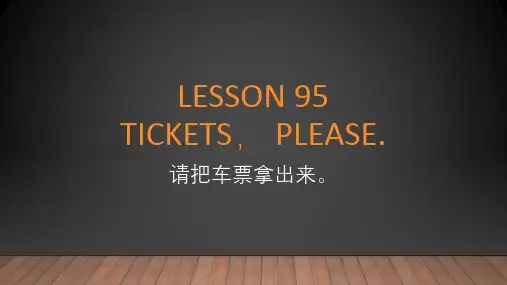
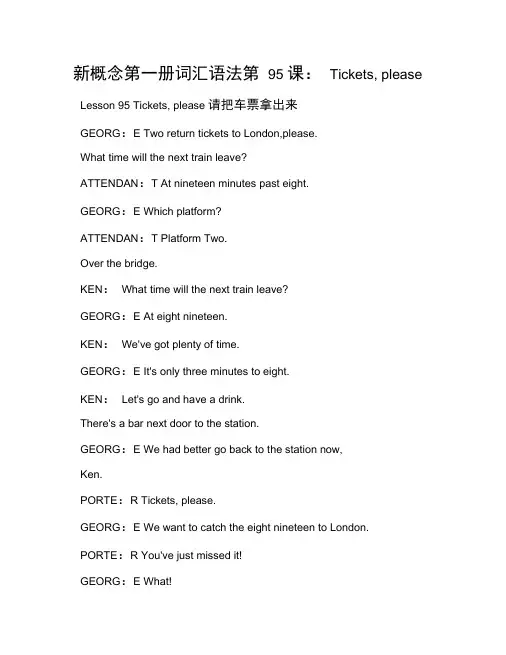
新概念第一册词汇语法第95 课:Tickets, please Lesson 95 Tickets, please 请把车票拿出来GEORG:E Two return tickets to London,please.What time will the next train leave?ATTENDAN:T At nineteen minutes past eight.GEORG:E Which platform?ATTENDAN:T Platform Two.Over the bridge.KEN:What time will the next train leave?GEORG:E At eight nineteen.KEN:We've got plenty of time.GEORG:E It's only three minutes to eight.KEN:Let's go and have a drink.There's a bar next door to the station.GEORG:E We had better go back to the station now,Ken.PORTE:R Tickets, please.GEORG:E We want to catch the eight nineteen to London. PORTE:R You've just missed it!GEORG:E What!It's only eight fifteen. PORTE:R I'm sorry, sir.That clock's ten minutes slow.GEORG:E When's the next train? PORTE:R In five hours' time!乔治:买两张到伦敦的往返票。
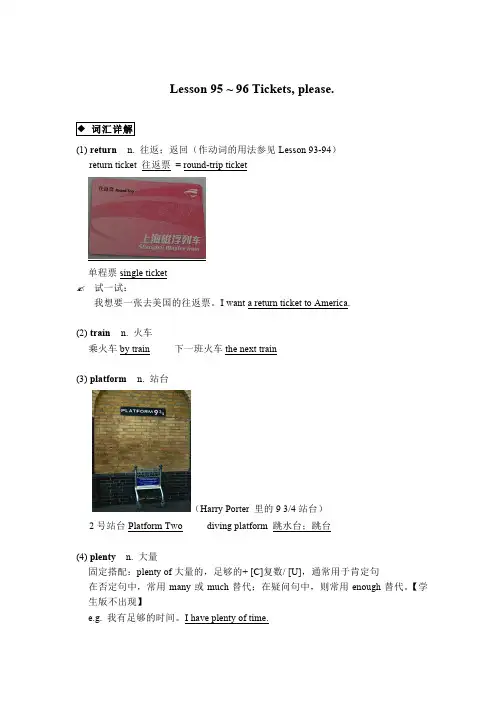
Lesson 95 ~ 96 Tickets, please.◆ 词汇详解(1) return n. 往返;返回(作动词的用法参见Lesson 93-94)return ticket 往返票= round-trip ticket单程票single ticket!试一试:我想要一张去美国的往返票。
I want a return ticket to America.(2) train n. 火车乘火车by train 下一班火车the next train(3) platform n. 站台(Harry Porter 里的9 3/4站台)2号站台Platform Two diving platform 跳水台;跳台(4) plenty n. 大量固定搭配:plenty of大量的,足够的+ [C]复数/ [U],通常用于肯定句在否定句中,常用many或much替代;在疑问句中,则常用enough替代。
【学生版不出现】e.g. 我有足够的时间。
I have plenty of time.(5) bar n. 酒吧【学生版不出现】文化背景:访问英国的人会发现传统英国酒吧是最能领略当地文化的地方。
但对于初来乍到的异国人来说,这些友善的酒吧却犹如潜藏着有惹事危险的"地雷区"。
一位人类学家和一组研究人员揭示了某些鲜为人知的英国酒吧文化。
人们首先遇到的困难是从买酒开始的。
大多数英国酒吧都没有酒保,你得到吧台去买酒。
这听上去似乎让人觉得不方便,可却有它深刻的内涵。
在因其冷漠而出名的英国社会里,酒吧文化的形成是为了促进社会交往。
排队的时候可以和其他等待买酒的人交谈。
在英伦诸岛上,和陌生人亲切地交谈被认为是完全适宜的正常行为的唯一场所可能就是吧台了。
“你如果没去过酒吧,那就等于没有到过英国。
"这对那些想要领略"英国生活和文化核心部分"的人是一种行为准则。
酒吧主要有以下几种形式:主酒吧(main bar),服务酒吧(service bar),宴会酒吧(banquet bar),绅士酒吧(gentleman bar),会员制酒吧(club bar),鸡尾酒廊(cocktail lounge),酒馆(tavern)。
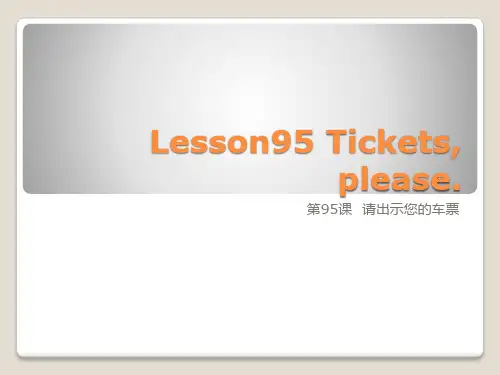
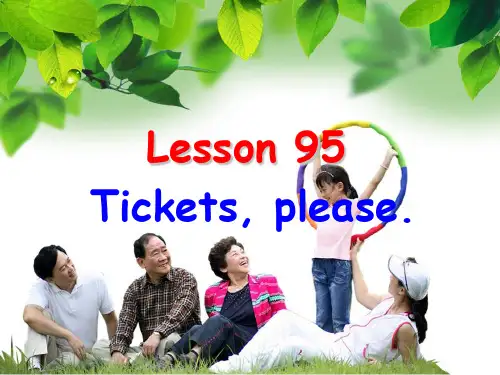
Lesson95 Tickets, please.return n. 1) 往返return ticket 往返票in return 作为回报You sent me a postcard, in return, I sent you a postcard too.你给我寄来明信片,我也回寄一张明信片。
v. 2)回到return from…to… 从…回到… return sth to sb = return sb sth 把…归还某人train1) n. 火车take the train to … 乘火车去…We’ll take the 2:00 p.m. train to Shanghai.我们要搭下午2点的火车去上海。
2)v. 训练,培养He is training the horse for the race.他为了比赛在训练那匹马。
You should train your children how to respect others.你应该教导你的孩子如何尊重别人。
trainer训练员, trainee 受训者,实习生platform1) n. 站台,月台an arrival platform 到站站台platform No.2 = platform 2 第二站台I’m waiting for you at platform 5.我正在第5站台等你呢。
2)n.讲台,讲坛The teacher is standing on the platform and looking at the students.老师站在讲台上看着学生们。
Plenty 1)n. 大量plenty of…后接可数名词或不可数名词,通常用于肯定句。
谓语动词的单复数形式须与其修饰的名词一致。
There is plenty of milk in my cup. 我杯里有许多牛奶。
There are plenty of students in the classroom. 教室里有好多学生。
新概念第一册词汇语法第95课:Tickets, please Lesson 95 Tickets, please请把车票拿出来GEORGE: Two return tickets to London,please.What time will the next train leave?ATTENDANT: At nineteen minutes past eight.GEORGE: Which platform?ATTENDANT: Platform Two.Over the bridge.KEN: What time will the next train leave?GEORGE: At eight nineteen.KEN: We've got plenty of time.GEORGE: It's only three minutes to eight.KEN: Let's go and have a drink.There's a bar next door to the station.GEORGE: We had better go back to the station now, Ken.PORTER: Tickets, please.GEORGE: We want to catch the eight nineteen to London. PORTER: You've just missed it!GEORGE: What!It's only eight fifteen.PORTER: I'm sorry, sir.That clock's ten minutes slow. GEORGE: When's the next train? PORTER: In five hours' time!乔治:买两张到伦敦的往返票。
新概念英语第一册第95-96课:Ticket,please._新概念英语第一册7课Listen to the tape then answer this question.Why did George and Ken miss the train?听录音,然后回答问题。
为什么乔治和肯误了火车?George: Two return tickets to London please. What time will the next train leave?乔治:买两张到伦敦的往返票。
下一班火车什么时候开?Attendant: At nineteen minutes past eight.服务员:8点19分。
George: Which platform?乔治:在哪个站台?Attendant: Platform Two. Over the bridge.服务员:2号站台。
过天桥。
Ken: What time will the next train leave?肯:下一班火车什么时候开?George: At eight nineteen.乔治:8点19分。
Ken: We’ve got plenty of time.肯:我们时间还很宽裕。
George: It’s only three minutes to eight.乔治:现在才7点57分。
Ken: Let’s go and have a drink. There’s a bar next door to the station.肯:让我们去喝点东西吧,车站旁有一个酒吧。
George: We had better go back to the station now, Ken.乔治:肯,我们现在最好回车站去。
Porter: Tickets please.收票员:请把车票拿出来。
George: We want to catch the eight nineteen to London.乔治:我们要乘8点19分的车去伦敦。
新概念第一册词汇语法第95课:Tickets, please Lesson 95 Tickets, please请把车票拿出来
GEORGE: Two return tickets to London,please.
What time will the next train leave?
ATTENDANT: At nineteen minutes past eight.
GEORGE: Which platform?
ATTENDANT: Platform Two.
Over the bridge.
KEN: What time will the next train leave?
GEORGE: At eight nineteen.
KEN: We've got plenty of time.
GEORGE: It's only three minutes to eight.
KEN: Let's go and have a drink.
There's a bar next door to the station.
GEORGE: We had better go back to the station now, Ken.
PORTER: Tickets, please.
GEORGE: We want to catch the eight nineteen to London. PORTER: You've just missed it!
GEORGE: What!
It's only eight fifteen.
PORTER: I'm sorry, sir.
That clock's ten minutes slow. GEORGE: When's the next train? PORTER: In five hours' time!
乔治:买两张到伦敦的往返票。
下一班火车什么时候开?
服务员:8点19分。
乔治:在哪个站台?
服务员:2号站台。
过天桥。
肯:下一班火车什么时候开?
乔治:8点19分。
肯:我们时间还很宽裕。
乔治:现在才7点57分。
肯:让我们去喝点东西吧,
车站旁有一个酒吧。
乔治:肯,我们现在回车站去。
收票员:请把车票拿出来。
乔治:我们要乘8点19分的车去伦敦。
收票员:你们刚好错过了那班车。
乔治:什么!现在只有8点15分。
收票员:对不起,先生,那个钟慢了10分钟。
乔治:下一班车是什么时候?
收票员:5个小时以后!1.plenty of, 充足的,充足的。
后面可跟可数名词或不可数名词。
2.ten minutes slow, 慢 10分钟; ten minutes fast, 快 10分钟。
3.When's the next train?下一班车是什么时候?
这个句子是用来询问火车启程时间时常见的句型。
had better与must
had better表示“还是”、“”,表达某种忠告或建议。
must则表示“必须”、“一定”,语气比 had better强烈。
had better表示现在时或将来时,而不是过去时。
其否定形式为had better not1.exact adj.
(1)精确的;确切的;恰好的:
What is the exact time?
确切时间是什么时候?
This vase is an exact replica.
这只花瓶是件很巧妙的复制品。
It's the exact shape I've been looking for.
这恰好是我一直以来要寻找的形状。
(2)严格的;严厉的:
The workers must obey exact rules.。